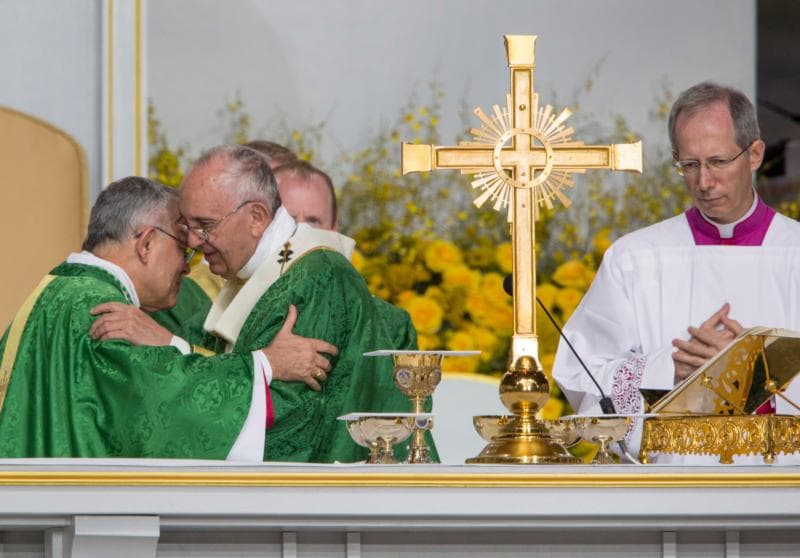God “loved me first, before I myself could love at all,” as Archbishop Charles J. Chaput quotes Joseph Ratzinger in his new book, Strangers in a Strange Land.
“It was only because he knew me and loved me that I was made,” the citation continues. “So I was not thrown into the world by some operation of chance….and now have to do my best to swim around in this ocean of life, but I am preceded by a perception of me, an idea and a love of me.
“They are present in the ground of my being…God is there first and loves me. And that is the trustworthy ground on which my life is standing and on which I myself can construct it.”
Philadelphia’s archbishop quotes this passage to get us back to basics. The Church’s real power isn’t in buildings and structures or public-policy statements, but in “her ability to form and lead her people — and to be their first loyalty,” he writes.
“When Catholics trust their leaders and believe their teaching, the Church is strong. When they don’t, or when they lose sight of who and what the Church is, she’s weak. This is why bishops are so gravely accountable for their actions and inactions. It’s also why Catholics who undermine trust in Church teaching sin so seriously against their own baptism,” Chaput says.
“To recover the Church’s identity, we first need to recall our own,” Chaput continues. “Our lives are a gift of God’s love. As Catholics, we believe that God himself is a Trinitarian communion of persons united in essence and love.”
He goes on to talk about how “God made us in his image and likeness so that we, too can live in communion, both with God and other people. The world tells us that we exist to satisfy our will; that we become more human by getting or taking what we want. Jesus taught the opposite. He shows us that being an image of God means living in communion founded on self-gift.”
Cardinal Timothy Dolan often says that he’s blessed to be able to spend a good part of his days saying “thank you” and “welcome” to people.
Reading Strangers in a Strange Land, I was reminded of A People of Hope, the interview book Crux editor John Allen did with Dolan a few years back.
During one of the exchanges, the archbishop of New York said that instead of starting conversations with labels, he’d rather welcome someone and help him see he is a “child of God and redeemed by the blood of his only begotten Son, destined to spend eternity with him. When God looks at you, he sees a work of art. That’s who you are.”
His point was that no one should let themselves be defined by anything else but this awesome reality. If people could begin here – be healed, or at least separated from the noise of cultural and social noise for a moment — we might find we have a whole lot more in common than we realize.
Dolan suggested such an approach might be “rather liberating” and “ennobling.” And he offered the Church as “the best friend of humanity,” explaining that “if you see yourself as God sees you, well, you will act virtuously.”
You might actually want to act virtuously, because you might see at least the hints of design and plan, with a desire to know more. Citing John Paul II, Dolan mentions “the great temptation today is to define our worth by having and doing, not being.”
The Church, meanwhile, is best when it is guiding and walking with people “along the path to true happiness and fulfillment, the kind of happiness that lasts a lifetime and extends into eternity.”
In Strangers in a Strange Land, Chaput says: “We’re…called — every one of us — to bring the Gospel to all those we encounter. We can’t confine the love of God to our family, our parish, or our particular culture. Rather, we all have the “exalted duty of working to assure that each day the divine plan of salvation is further extended to every person, of every era, in every part of the earth.
“The Church,” he writes, “is a communion of persons filled with the Holy Spirit, who give themselves in love to each other and to God, together. Their communion—when it’s lived zealously and joyfully—shows the world the loving communion that exists in God himself.
“In this communion, we’re called to help each other achieve holiness. Different people have different roles to play. And these don’t exist in competition with one another, but are complementary and placed in the service of others.”
About Pope Francis, Chaput writes, “There are no unhappy saints, and joy and hope are constant themes in the work of Pope Francis. Like Saint Paul, he sees the source of Christian joy in the act of preaching the Gospel, in a passion for living the Good News and actively sharing the person of Jesus Christ with others.
“This is why he has such urgent words for tepid Christians. This is why he can seem so impatient with believers who let their hearts grow numb.
“If we don’t share our faith, we lose it. Without a well-grounded faith, we can’t experience hope, because we have no reason to trust in the future. And without hope, we turn more and more inward and lose the capacity to love.”
Looking out on the world, does anyone doubt that hope, and communion, and, indeed, love, are needed? If some of us followed the lead of these three pastors, trying to help people see who we all are through the eyes of God, things might just take a turn for the better.
Kathryn Jean Lopez is senior fellow at the National Review Institute and editor-at-large at National Review. She is a Crux contributor.














